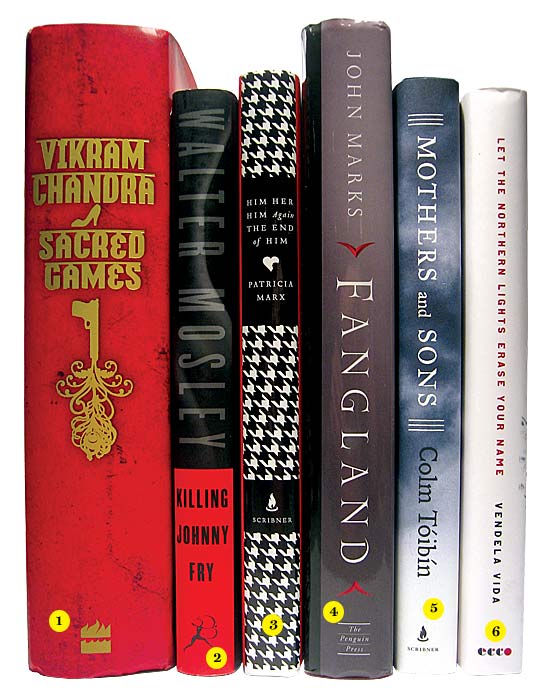
(1.) Sacred Games
By Vikram Chandra, HarperCollins
Go ahead, call this 900-page epic a Mumbai Godfather. But it’s also the ultimate subcontinental noir. That Inspector Sartaj Singh gives in to corruption simply makes him practical. It’s in the air, mixed with the tar and tandoori and gunsmoke that smell like home to him and to his superbly rendered foe, the arch-gangster Ganesh Gaitonde, whose narration of his own rise and fall is the meat of the book. But even as Chandra digresses to depict the horrors of partition, he stays in the skin of his characters, never resorting to DeLillo-ish atmospherics. That’s probably why he slyly includes a cast-of-characters list but no glossary—so for Western readers, half the suspense comes from figuring out what the hell apradhi, chutiya, and bhai mean. That can slow things down, and the ticking-atomic-bomb plot is a little pat, but any book that makes palpable a very foreign city, explores deep moral questions, and teaches you lots of dirty Hindi is well worth lugging around.
BUY IT
(2.) Killing Johnny Fry
By Walter Mosley, Bloomsbury USA
The awful subtitle—“A Sexistential Novel”—is a warning for fans of Mosley’s hard-boiled fiction. It’s also an awkward summation of the book’s mix of sex and theorizing. Mosley admits as much when his protagonist—a black translator who discovers his girlfriend having anal sex with a profoundly hung white man—stares into a mirror and observes, “There I was, dick in hand, philosophizing about sexuality.” Mosley proves he can write hot, disturbing sex scenes, but his best tools (badass dialogue, brisk plotting) fail him. The novel’s biggest turnoff is a phone-sex operator who serves as Greek chorus, therapist, and plot device introducing our horndog hero to the ridiculous Sisypha, sensitive queen of the porn world. Once again, Mosley proves he’s our most recklessly ambitious popular author—but this time, the gambit sputters to an unsatisfying conclusion.
LEAVE IT ON THE SHELF
(3.) Him Her Him Again the End of Him
by Patricia Marx, Scribner
The first half of this book is hilarious. The next quarter is less funny. And the ending basically implodes, but there’s enough funny overall to make it a worthwhile read if you’re looking for a proportionally satisfying chunk of satire. A romantic comedy with a sour center, Him Her recounts a relationship that wavers from tenuous to pathetic: a woman dating (and/or strung along by, deluding herself about, cheating with) an analytic philosopher turned philosophical analyst, a man whose idea of a compliment is, “Your kisses are so recondite, my peach, that they are almost notional.” Moments of painful recognition await anyone who has gone to graduate school, dated a narcissist, or both.
WAIT FOR THE PAPERBACK
(4.) Fangland
By John Marks, The Penguin Press
Evangeline Harker, a pretty young associate producer for TV’s top newsmagazine, goes to Transylvania (ahem) to seek out an evil crime lord named Ion Torgu. Guess what sort of guy he turns out to be? Suffice it to say that, in these pages, there’s at least one actual bucket of blood and guts, a missionary who gives our heroine a crucifix for protection, and the remarkable revelation that digital video-editing systems can contain and transmit malign spirits that destroy viewers’ psyches. Marks, a former 60 Minutes producer, was smart to set a supernatural thriller among the evil creatures of the network night. (By the time you’re done, it’ll be hard to avoid dark thoughts about the undead Mike Wallace.) But klutzy, overboiled prose, employed to portray characters who react to horrific things in ridiculous and implausible ways, drains the life force from this story pretty fast.
LEAVE IT ON THE SHELF
(5.) Mothers and Sons
By Colm Tóibín, Scribner
Among the sons in question here are a career criminal who’s just nicked a Rembrandt, a priest who’s about to make the tabloids, and a severe depressive. The mothers are estranged, alcoholic, traitorous, dead, or presumed buried in the snow. Good thing this didn’t hit stores before the holidays; it’s not necessarily a gift for the whole family. But it’s a terribly beautiful book, the first collection of short stories from the Irish writer who novelized Henry James’s internal life in The Master. So short are some of the stories, in fact, that you find yourself worriedly counting their remaining pages, aching for characters to connect and marveling at Tóibín’s ability to quietly convey the various ways in which they will and won’t. Rarely has fiction about nonconnectedness, about loneliness and emptiness and isolation, felt so un-cold.
BUY IT
(6.) Let the Northern Lights Erase Your Name
By Vendela Vida, Ecco
How much darkness and hurt can you pack into a novel as slim and spare as Vida’s second? More than you’d expect, considering the adjective-starved prose that conveys Clarissa Iverton’s near catatonia. Her mother vanished years ago, and now it turns out her newly buried father wasn’t her biological dad. So she herself does a runner, fleeing to Lapland in the winter in search of her real parents. The setting matches the plot: numbing cold; long darkness suffused occasionally with dim twilight; and the rare, stunning aurora borealis of a revelation. Vida’s laconic wit and uncompromising character sketches set her book apart from her generation’s tired quest-for-self genre—until a rushed and unwarranted ending crashes through the gates. The devastation of maternal failure, while not much fun to read about, is Vida’s strong suit here. The hardest part comes in finding a plausible way out of a ruined past, and she hasn’t quite done that.
WAIT FOR THE PAPERBACK